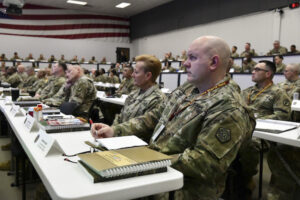
Story by Jose Rodriguez
U.S. Army Medical Center of Excellence
JOINT BASE SAN ANTONIO – FORT SAM HOUSTON, Texas—Sergeants Major from across the Army Medicine enterprise convened at a four-day summit hosted by the U. S. Army Medical Center of Excellence on JBSA-Fort Sam Houston, January 16-19. More than 170 chief medical noncommissioned officers, also known by their military occupational specialty as 68Z, discussed the U.S. Army’s shift from brigade-centric warfare to large-scale combat operations, multi-domain operations, force modernization and how to shape the future roles of Army Medicine enlisted professionals to meet the Army’s needs.
The senior enlisted representatives who attended the summit were from Army active-duty units, National Guard and Army Reserves. Participants received briefings on current Army Medicine operations, operational threats and contingencies, medical research, casualty management, force shaping and medical readiness. A wide spectrum of DOD and Army representatives spoke at the summit.
During his opening remarks Brig. Gen. Clinton Murray, commanding general MEDCoE, shared with the audience the purpose of the summit. “I’m going to talk about the why,” said Murray. “We’re changing how we [the Army] look on the battlefield; we’re changing how we fight on the battlefield, and we, Army Medicine, have to lean into that–understanding that we’re looking at the Army of 2030 and the Army of 2040. What we did in Iraq and Afghanistan does not, and will not, exist in a future space.”
Operational forces require Army medical professionals to be prepared and capable of providing medical support in large scale combat operations. These will include prolonged care, treating disease and non-battle injury patients, providing blood closer to the point of injury, sustaining advanced skill requirements outside of the institutional training environment, and integrating non-medical personnel into unit casualty response procedures.
“This is the first time we have brought our 68Z population together at this scale,” said Command Sgt. Maj. Timothy J. Sprunger, command sergeant major of the U.S. Army Medical Command, in his opening comments. He highlighted the importance of representatives of having National Guard and Army Reservists attending the summit and encouraged the senior leaders exchange information.
“Have conversations all week, learn people’s names, understand who they are,” said Sprunger on the importance of developing relationships.
Sprunger also emphasized the important role of senior enlisted leaders in supporting junior enlisted Soldiers.
“Our enlisted Soldiers volunteered to do a job. We have to make sure they are empowered to do that job. If we have our enlisted soldiers integrated into their team as a trusted member that actually does health care our doctors can see more patients. Our soldiers will get the training that they deserve to be effective.”
Along with the briefings and discussions, the sergeants major also had the opportunity to tour training facilities, speak with instructors, and visit with Soldiers attending medical advanced individual training. The candid dialogue with instructors from various medical professions, provided additional insight to how MEDCoE is continuing to modernize training platforms, ensuring the students who graduate from the various courses can provide the best care or services as soon as they report to their unit. The group also experienced medical training in a joint environment during classroom visits at the Medical Education and Training Campus. The tri-service campus, located on JBSA-Fort Sam Houston, has 48 medical programs in various medical specialties.
Bringing together 68Zs from across the Army, including the National Guard and Reserves, to meet face-to-face and interact was invaluable to supporting the national military strategy. MEDCoE Command Sgt. Maj. Victor Laragione underscored the importance of the summit.
“This is our opportunity to come together, to grow together and to understand where Army Medicine is going,” said Laragione. “We are the foundation of where Army Medicine starts–where we sustain and transform Army Medicine. It is important for us to develop what comes next so that our soldiers are best prepared on the battlefield.”